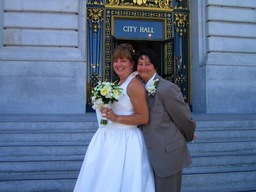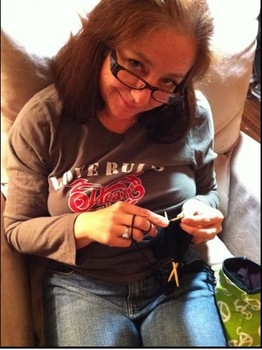1. What’s your name? Where do you live? How old are you?
Angie Dillon-Shore. I live in Guerneville, California, a little gay-meets-redneck town in the Redwoods in west Sonoma County near the Russian River. I’m 48 years old.
2. Where did you grow up and how would you describe your childhood?
I grew up in Indiana in a Catholic, white, upper middle class family. Academic and career achievement was very important in my family for both girls and boys, as well as the expectation that we all marry and have a family. My parents are staunch democrats and have always been on the left-leaning side of the church (in fact, my mom left my dad for our parish priest who had to leave the priesthood). She’s been pro-choice always and reveres people like MLK, Willie Nelson, Obama, Elton John and Gloria Steinem.
I really don’t remember many people who varied much from traditional gender roles during the ’60s and ’70s, except for a couple of the nuns (who were rumored to be lesbians). They didn’t wear habits, but rather wore pants and button down shirts. We kind of made fun of them and I really didn’t think about it very deeply, as I was working very hard to keep my own gayness from myself.
My mom achieved a MA while raising her three kids, and then was a working mom, who climbed the government job ladder to be a Dept. of Labor bigwig. She was my mentor, as was my grandmother, who did exactly as she pleased, was very outspoken, often sarcastic, traveled all over the world alone and didn’t like men much. She dressed very fashionably and wore lots of jewelry, but always had someone else doing the cooking and cleaning. I saw her as a goddess.
3. How would you describe your current family and close support community?
My current family is my wife, my 24-year-old son and daughter-in-law, my pets, my close friends, and my parents. My support community consists of my wife, a fairly small group of friends whom we trust because they think about the bigger picture (some of whom are fairly gender variant) and my mom.
4. What are some of the things you do on an average day?
Shower, go to work where I boss people around for social good (in a nice way), drive home, take care of many pets, share cooking responsibilities with my wife (if she’s not traveling for work), watch Rachel Maddow and other cable shows, knit and read. Then I get up and do the same thing all over again (except on the weekends when we go on day trips and sometimes go to the gay bar in town). My wife and I tend to divide up the house stuff in a semi-traditional way—she does most of the fixing stuff, heavy lifting, and renovations, whereas I’m more likely to do the laundry, grocery shopping, and most of the cleaning. However, this has been a point of contention at times (fair division of labor).
5. What do you do to pay the bills?
I’m a Program Director at a large non-profit that is a federally-designated poverty fighting agency. We serve low-income folks with a broad range of programs and services and do a lot of grassroots community building and advocacy. My wife works for an international accounting firm advising on implementation of financial software.
6. Does your life look like what you imagined it would when you were young?
Not at all. I didn’t really do much imagining, I figured I be a teacher (that career lasted about a year, then I went back to school).
7. What is the greatest challenge you’ve faced in your life?
Coming out at 34 after 10 years of marriage to a man and trying to figure out how I was supposed to “be” and “look” to be accepted as a “real” lesbian. I tried the butch hair, flannel shirts, etc., but after a year, decided that wasn’t at all necessary.
8. Have you made any decisions or choices that have surprised those around you?
Divorcing my husband. Coming out at 34. Having a string of relationships with very butch girls who were all 10 years younger than me. Supporting my son to go live in India after one year of (unsuccessful) college attendance.
9. Who have you looked to for inspiration while creating your life? What have they taught you?
My mother, grandmother, women friends of all ages who are intelligent, thoughtful, and politically-minded people, and most of all, my son. I’ve learned that growing older is a wonderful thing, that women tend to be smarter and more compassionate than men and that if you intentionally raise a boy to be compassionate, kind, respect women (and all people), he will grow up to do so.
10. How often do you think about gender roles and whether your life matches what others might expect from your gender?
I think about gender roles probably more often than the average person. I’ve worked in human services for 25 years, often with young people, so gender variance has come up many, many times in that context. (Typically, providing extra support to gender variant youth who have run away, have been abused, are getting bullied, hated on, or otherwise treated like shit.)
 As far as myself, my gender role identity is overlaid with the fact that I’m also a married lesbian who has raised a son. My wife and I do some things in the world and in our relationship that are probably a traditional male (her)/female (me) thing, but certainly not strictly divided. I actually wear the pants in the family.
As far as myself, my gender role identity is overlaid with the fact that I’m also a married lesbian who has raised a son. My wife and I do some things in the world and in our relationship that are probably a traditional male (her)/female (me) thing, but certainly not strictly divided. I actually wear the pants in the family.
I do love me a cute, soft, butch girl.
11. What TV shows, movies, music, or books have been particularly formative or important in your life?
TV and movies: Boys Don’t Cry, Temple Grandin, so many movies about underdog women who overcame challenges and rose from oppression into their own power or were unjustly treated for refusing to be anyone other than who they were.
Music: Lucinda Williams, Ani DiFranco, Indigo Girls, Joni Mitchell, Carol King, Liz Phair, Johnette Napolitano, Linda Perry, and all the rest of them.
Books: all the Feminism 101 books I read while attending UC Santa Cruz. Susie Bright’s books on sex positivity.
12. Are there any stories not told in media that you’d like to see represented?
Stories about ordinary women and people, particularly in countries that are not white culture dominant, that overcome great obstacles to bring significant goodness to the world.
13. What wisdom have you gained in life that you think other people would benefit from knowing?
Gratefulness and appreciation are the basis of contentment. Trust your gut instincts because they’re nearly always right. You are more powerful, creative, and smarter than you might think you are. Real leaders create new leaders. All forms of injustice are equally abhorrent.


